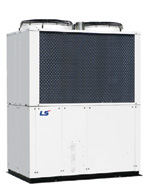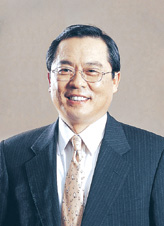Beefing up
Operations in China
LS Cable expands its air-conditioning plant in Qingdao to expand market share
 LS Cable Co. held a dedication ceremony July 21 for the relocation of its expanded plant to Qingdao, Shandong Province, China, to advance into China's air-conditioning equipment market, the company announced recently.
LS Cable Co. held a dedication ceremony July 21 for the relocation of its expanded plant to Qingdao, Shandong Province, China, to advance into China's air-conditioning equipment market, the company announced recently.
The company set up its industrial air-conditioning manufacturing plant in Pyngdu, Shandong Province, in 1997, through its wholly-owned subsidiary LS Air-conditioning system Shandong and produced and marketed the absorption-type cold and hot water equipment and the company expanded the plant and relocated it to the Chenyang District in Qingdao with the additional investment of $10 million.
The newly relocated plant is equipped with facilities to produce all kinds of industrial air-conditioning equipment ranging from absorption-type cold and hot water stands to turbo air-conditioning, gas heat pump, and fan coil unit, among others.
LSAS plans to develop its air-conditioning equipment segregated by China's six large regions including Northeast, East China, and western region,
 targeting its sales for this year at $30 million double from last year, and more than $100 million by 2010 to become one of the five largest companies in the area of air-conditioning equipment production.
targeting its sales for this year at $30 million double from last year, and more than $100 million by 2010 to become one of the five largest companies in the area of air-conditioning equipment production.
LSAS plans to make the building air-conditioning system, GHP, developed by LS Cable one of its major climate control products in China under its own strategy to produce and market them locally.
The Chenyang District in Qingdao is the industrial complex opened in 1994 and a total of 5,500 foreign companies operate plants in the industrial park including 1,300 South Korean plants, within easy reach of Qingdao harbor considered as a logistics center.
Dignitaries on hand included, on the Chinese side, Yu Chong, vice mayor of Qingdao City, and Li Xuehai, party secretary, among others, and the Korean side Koo Cha-yol, vice chairman, and managing director Shim Jae-sol and others totaling some 300.
Absorption type Cold and Hot Water Equipment. It uses LNG as a fuel and is being used as cool and hot air-conditioner for office buildings.
 Turbo Air Conditioner: It uses electricity to run and is used for semiconductor, chemical and nuclear power plants as air conditioner.
Turbo Air Conditioner: It uses electricity to run and is used for semiconductor, chemical and nuclear power plants as air conditioner.
GHP(gas, heat, pump): it uses LNG and used as cooler in the summer and heater in the winter for schools, buildings, offices, large marts, and others.
In the meantime, LS Cable said its machinery department has completed its relocation to Jeonju, North Jeolla Province, following the tractor department, and most recently the injection and air-conditioner production departments, opening the age of Jeonju City for the company in a ceremony held on July 13.
Attending the ceremony included, on the government side, were Gov. Kim Wan-ju of North Jeolla Province, Mayor Song Ha-jin of Jeonju city, Country Chief Lim Jong-yop of Wanju County, among others, and Koo Cha-yol, vice chairman, Lim Jae-sol, managing director of the Machinery Business Headquarters and a total of some 300 company employees.
The Jeonju Plant is located in the 46,000 pyeong space in the North Jeolla Science Industrial Complex in Wanju County, North Jeolla Province. It has tractor, injection and air-conditioning production departments, along with other facilities such as plant employees welfare facilities, dormitories and apartments for company employees.
The tractor department first produced the first tractor in October since its relocation to Jeonju in September, equipped with modern production facilities and test-ground for tractors.
In the case of the injection department, a recent arrival at the park, it has made its production line, flowing one, so that it could make both small and electricity moving injection production possible with its 14 cells. The air-conditioning department, which produces cooling equipment for buildings, too, made its production facilities compact to raise effectiveness of production and quality.
In addition to modern high-tech production facilities, the company put its full weight behind the welfare areas for its employees when moving to Jeonju. It rented an apartment building and provided to employees free of charge. The company also built dormitories for unmarried employees four stories high including a basement on a 9,700 pyeong land with a swimming pool, health facilities, table tennis, and a golf practice range, among others, in addition to four-story dormitories. The company plans to open the facilities to local residents.
The machinery unit of the company is centered around the machinery production business taken over from the Korea Heavy Industrial Co. in 1983. The unit recorded 388 billion won in sales last year and the operating profit of 23 billion won turning out large annual profit for two years in a row, rapidly emerging as a group of profitable units in the company. The unit is projected to make 450 billion won in sales with a vision to be a global player in the areas of injection, small and medium tractors, and air conditioning based on business competitive strength it has secured since moving to Jeonju.
Vice Chairman Koo, in a speech at the ceremony for relocation, said the LS Electric Wire plants in the new industrial complex should make contribute to the local community and be with local residents all the time, and be a model in the regional community.
"Let us become a company that revitalizes the economies of Wanju County, Jeonju City and North Jeolla Province,"the vice chairman said.
First in Korea, the central laboratory of LS Cable succeeded in developing on July 22 the eco-friendly heat-resistant cable used in LNG ship. This followed the development of lead free and flame retardant PP (Polypropylene) cable for automobiles
This product is the first new material applied in ship cable eliminating halogen that causes environmental contamination. It specially features special insulating material with high stability in high temperature (exceeding 300กษ) for optimum thermal resistance, better than existing ship cables. To pre-occupy the ship market of high-value, LS Cable strategically developed this product.
PVC material was generally used as insulating material for ship cable, but the halogen-free insulating material was applied due to the high demand for eco-friendly cable in special ship like LNG (Liquefied Natural Gas). It is expected that this eco-friendly new product would replace the existing market in the future.
LS Cable decided to apply this product to ship cables equivalent to US$13million which recently place orders. In the future, more extensive marketing activities will be made for overseas shipyards and ship owners as well as domestic shipbuilding companies.
LNG ship cable is the electric cable supplying electricity to electric power and controlling equipment, communication and lighting equipment, and other major facility inside the LNG ship.
For LNG ship, complete safety is required preventing explosion and water leakage during sailing since it transports natural gas in liquid condition. Therefore, cable used inside the LNG ship also has to secure a proven heat resistance and reliability compared to general ship cable. nw
(Photo from left) A dedication ceremony for LS Air-conditioning system Shandong, a wholly-owned subsidiary of LS Cable Co. in Qingdao, China;GHP(gas, heat, pump) developed by LS Cable to be produced and marketed by LSAS in China;
Vice Chairman and CEO Koo Cha-yol of LS Cable Co.
3Fl, 292-47, Shindang 6-dong, Chung-gu, Seoul, Korea 100-456
Tel : 82-2-2235-6114 / Fax : 82-2-2235-0799